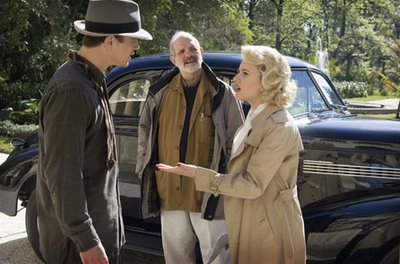 "And the thing that's really fascinating about
"And the thing that's really fascinating about Raising Cain
is you see a guy -- and I, and I, and I told this to him and he agreed with me. I don't know, I thought Raising Cain
was a blast. I had a total blast out of watching it. But part of the fun about the movie -- which I don't, you know, if the studio liked it that much -- was the fact that it almost, the whole thing works to annoy the viewer because it, like -- you've got a man who's like, 'look, I created, more or less, in these last 20 years, this type of film. All right, and, and I do it better than anybody, but you know what? I'm bored with doing it now. All right, so the only way I can make it interesting for me, is to completely dissect it and not pay you off.'"-- Quentin Tarantino (all [sic], natch) on
Charlie Rose, 10/14/94
"Why couldn't we have an intercom to hear her, rather than a TV?"-- Lolita Davidovich, in
Raising Cain re: her and John Lithgow's daughter
Popped out between a high-profile disaster (
Bonfire of the Vanities) and an underappreciated gem (
Carlito’s Way),
Raising Cain (1992) is arguably Brian De Palma's most elaborate private joke, designed to alienate 90% of the audience rather than the usual 60%. (Like most of the world, I initially hated it.) As has been well documented elsewhere, the script (by De Palma) falls somewhere between incoherent and irrelevant, with multiple John Lithgows lording over multiple corpses, an adulterous wife (Lolita Davidovich) and his attempt to abscond with his own daughter. (You can find a valiant attempt to sensically untangle the plot
here.)
The thing is, it’s not, as per the usual De Palma charge, simply a handful of great set pieces he cares about strung together by material he in no way cares about. If anything, the filler has been wholly eradicated, leaving us with not only great set pieces, but manifest odd diversions and, of course, a plot that makes that much less sense. This is all by design, though to call it campiness -- as per John Lithgow phalanx of all-too-game turns -- is only scraping the barrel. No mere fanboy fodder this --
Cain seems designed to separate the -heads from everyone else, not only deliberately irritating the audience, but going out of its way to do it.
Perhaps most infamously is the way that, after a fairly straightforward set-up, he drops us into a time warp, where, for about ten minutes, Davidovich continually wakes up and gets murdered. Simply a dream vs. reality mindfuck? Not so -- looking back after what follows it, each of its threads convey some important plot information, from her history with ex-lover Steven Bauer (via a hospital scene that contains one of his best uses of reflection) to their romp in the dreamy forest. (Though that last one’s not verified as a fact till later on.) It’s obvious that De Palma had written a very dry, boring stretch of flat plot, cut it up into ribbons and threw them in the air, assembling them in much the fashion George Martin did the middle section of the Beatles’ “Being For the Benefit of Mr. Kite.” Maybe that explains Davidovich’s gratuitous expository narration. (The section also contains the pantheon moment where he repeatedly cuts between Davidovich getting a stone sword in the heart with her waking up in mortal fear, highlighting the split second of waking consciousness during which we’re convinced our nightmare is really happening.)
But like I said,
Cain is all De Palma, no filler. So there’s more where that came from. De Palma constantly introduces something but doesn’t explain anything about it, staring with the opening zoom-out from a monitor showing Lithgow lovingly sleeping with his a little girl. Who’s Lithgow sleeping with? Who’s watching? (It later turns out it’s his version of a baby monitor for his daughter, and it runs 24/7 in he and Davidovich’s bedroom.) He denies us the thrills of the murder scenes: all homicides take place off-screen, and what ones we see are either fantasies or cut before we see the murderee actually die. (Another pantheon moment: De Palma cuts from a close-up of Lithgow’s blade en route to the deed to an overhead shot of the bloody body in a car trunk.) Along with the expected Hitchcock and Argento nods, there’s even a
Dressed to Kill homage. (He’s homaging himself! After already doing it in...
Dressed to Kill!)
There’s also a devastating parody of his signature traveling shot. Frances Sternhagen (who’s given a black wig for the sole purpose of having it stolen) is led by dics Gregg Henry and Tom Bower down an escalator, into a lobby and then
up an elevator, all while she dispenses expository dialogue. To make matters funnier: she repeatedly walks off in the wrong direction, and Henry and Bower have to grab her and point her in the direction the camera’s supposed to be going -- directors on a masterful shot that requires another take.
And needless to say, the part where Lithgow suddenly finds himself telling his younger self (i.e., a boy actor with a sped-up Lithgow voice) to fuck off is rather indescribably amazing.
Unlike other De Palma wank-offs (
Greetings and Hi, Mom!; Body Double; Femme Fatale), there’s no unifying statement(s), nor any attempt at some. I suppose you could argue that the film works in a reaction to charges of over-masculinity in films like
The Untouchables. Early on, Lithgow is unflatteringly dubbed “the perfect husband” (Bauer, of course, is the ideal male), while his other personalities (his “brother” and father) take turns remarking on his sissiness. By the end, Lithgow has not rebelled against this charge but embraced it, turning himself into a woman. But to say that that dominates the film is to ignore the film’s delirious ode to the director’s peerless craft.
[
This reevaluation has been performed in breathless anticipation of The Black Dahlia, coming to theaters near you Friday and to me tomorrow (i.e., Tuesday) morning. Whatever my thoughts on Dahlia turn out to be, go see it anyway, as De Palma needs all the money he can get to make more. Also, this reevaluation has been so silver-lined that I now wonder if I shouldn’t re-tackle the many other De Palmas I’ve hated or just not terribly liked through the years: Scarface, Wise Guys, Casualties of War, The Bonfire of the Vanities, Snake Eyes, and Mission to Mars. I think so.]
 Hello, all of you in the Philadelphia area. Forgive the relative formality of the following missive. I'm reprinting this from a mass e-mail I've been sending around.
Hello, all of you in the Philadelphia area. Forgive the relative formality of the following missive. I'm reprinting this from a mass e-mail I've been sending around.



